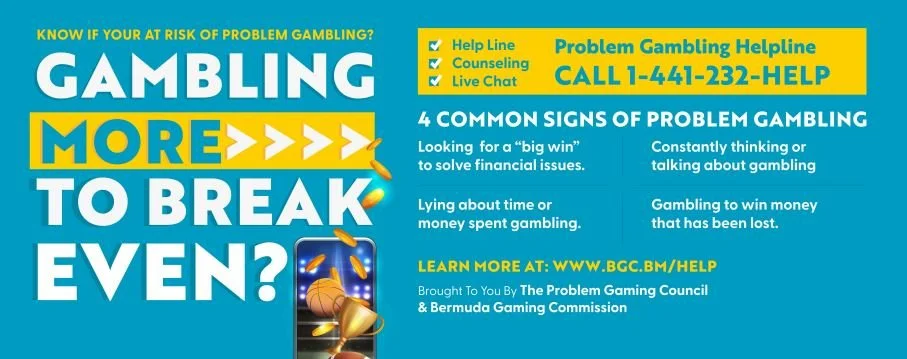Problem Gambling Frequently Asked Questions
What is Problem Gambling?
Problem gambling includes all gambling behaviour patterns that compromise, disrupt or damage personal, family or vocational pursuits. Problem gambling often coincides with other mental health issues or addictive behaviour such as substance abuse. In extreme cases, problem gambling can result in legal issues, loss of career and family, financial loss, and even suicide. Problem gambling isn’t just limited to casino gambling. Problem gambling can involve fantasy sports, online sports betting, raffles, video game addiction and more.
Go to www.psych.org to learn more about the American Psychiatric Association’s criteria for gambling addiction.
What are common signs of problem gambling?
There are signs that can tell you if gambling is becoming a problem. Typically, the more signs you are seeing, the greater the chance of a problem:
Lying about time or money spent gambling
Gambling to escape from boredom, problems, or responsibilities.
Gambling to win money that has been lost.
Arguing with family or friends about money and gambling.
Looking for a “big win” to solve financial issues.
Constantly thinks or talks about gambling.
Finding it difficult to control, stop or cut back on gambling.
To be assessed for problem gambling, see a training gambling counsellor or mental health professional. Consider doing a problem gambling self-assessment test to get a general idea of whether you are at risk.
Problem gambling just means addiction to games like poker and slot machines, right?
No, problem gambling can involve any game of chance. It could mean things like fantasy sports, raffles, and high-risk stock trading. One of the biggest areas of concern is actually online gambling and sports betting due to its easy access and lack of regulatory oversight. Also, some video games have components of gambling built into them, such as “loot boxes”.
What is responsible gambling?
If gambling is a form of entertainment you enjoy, it’s important to play as safely as possibly. Responsible gambling means gambling within your means and purely as a form of entertainment. Here are a few responsible gambling tips:
Understand the game you are playing and the actual odds of winning.
Make pre-determined commitments to the amount of time you will play, how much you can wager, and how much money you are willing to lose in one sitting.
If you are gambling online, be familiar with any responsible gambling tools built into the platform you are using and how to make complaints if needed.
Gamble with a friend who is aware of your pre-determined commitments so you can hold each other accountable.
When you no longer having fun, take a break.
Limit consumption of substances such as alcohol while gambling.
Be aware of any “magical thinking” you might have and belief in good luck.
Don’t chase losses to try to break even.
Be familiar with online gambling blockers and seriously consider whether you should be using one.
To learn more about how to gamble responsibly, go to www.responsiblegambling.org.
Someone I know has a gambling problem. What can I do?
Get informed
Learn more about problem and responsible gambling by visiting websites like www.responsiblegambling.org and www.gamblingtherapy.org.
Be prepared
Talking about problem gambling with a loved one can be emotionally triggering and can cause abusive and sometimes even violent reactions. Create a support system for yourself and consider whether a family member, friend, counsellor or religious group member should be present during discussions with your loved one.
Choose the right moment
There may be times when your loved one is more receptive to being confronted about their gambling (e.g. after experiencing regret due to gambling losses). Choose a good time to have a conversation with them. Keep calm, use an “I” point of view (e.g. “I think” or “I feel”), and try to negotiate clear boundaries and commitments with your loved one.
Protect yourself
Recognise the small steps your loved one takes to get better and be patient but still take steps to protect yourself and your assets. Ensure bank accounts are separate. Consider changing bank accounts, mortgages, and other assets so that the person who gambles cannot access them. Change your passwords and PINs to limit access to accounts and consider hiding your valuables.
Can children or teenagers develop gambling issues?
Research consistently shows that most youth have gambled at least once before their 18th birthday. In fact, youth are more likely to develop gambling related problems than adults. Adults who seek treatment for problem gambling often report being exposed to gambling from a very young age, especially from their parents. Some video games involve, mimic, or encourage gambling to youth. For example, “loot boxes” don’t have any real monetary value but can be sold and gambled.
What are some helpful contacts?
Below the below for helpful resources for gamblers and their families:
Mid-Atlantic Wellness Institute (MWI) 24-hour Mental Health Crisis Line 1-441-239-1111




